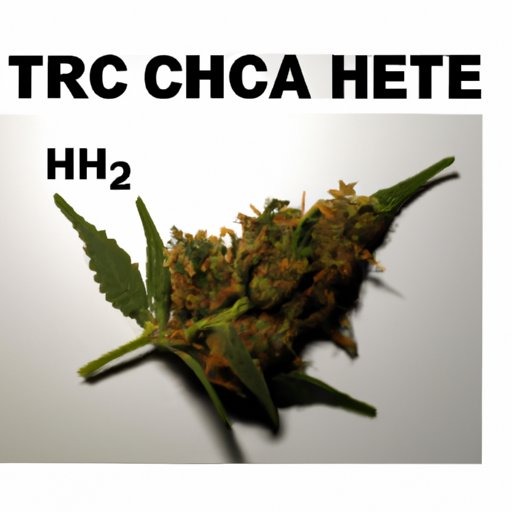
Introduction
THCA and THC are two cannabinoids that are often confused with each other. While both are derived from the Cannabis plant, they have different chemical properties and effects on the body. The confusion between THCA and THC can lead to misunderstandings about the benefits and risks of cannabis use. This article aims to clear up the confusion by providing a comprehensive overview of what distinguishes THCA from THC and how it interacts with the body.
The Truth About THCA: Why It Won’t Get You High
THCA stands for Tetrahydrocannabinolic Acid. It is a non-psychoactive cannabinoid that is found in raw Cannabis plants. Unlike THC, THCA does not bind well to the body’s cannabinoid receptors and therefore does not have any psychoactive effects.
When THCA is exposed to heat or light, it undergoes a process called decarboxylation, which removes a carboxyl group from the molecule and converts it to THC. This is why smoking or vaporizing Cannabis can produce intoxicating effects, while consuming raw Cannabis does not.
Scientific studies have confirmed that THCA does not produce psychoactive effects. In a study published in the journal Cannabis and Cannabinoid Research, researchers tested the effects of raw cannabis juice on healthy volunteers and found that it did not produce any significant psychotropic effects. Another study published in the British Journal of Pharmacology found that THCA had no effect on locomotor function or body temperature in rats.
Clearing up the Confusion: THCA vs THC
THC, or Tetrahydrocannabinol, is the primary psychoactive component of Cannabis. It is derived from THCA through a process of decarboxylation, which occurs when the plant is heated or dried. THC binds to the body’s cannabinoid receptors, particularly CB1 receptors, in the brain and central nervous system, to produce the characteristic euphoric and psychoactive effects associated with Cannabis use.
The chemical structures of THCA and THC are similar, but THCA contains a carboxyl group while THC has a double bond in its carbon chain. This subtle difference in chemical structure accounts for the different properties and effects of the two compounds.
There are many different strains of Cannabis, each with its unique profile of cannabinoids, terpenes, and other compounds. Some strains are high in THC and low in THCA, while others are high in THCA and low in THC. This is why different Cannabis strains can have varying effects on the mind and body.
Beyond Getting High: The Potential Benefits of THCA
While THC is primarily known for its psychoactive effects, THCA has been found to have a range of potential health benefits. Studies have shown that THCA has anti-inflammatory, neuroprotective, and analgesic effects. Research also suggests that THCA may have a role in cancer therapy, as it has been found to inhibit the proliferation of cancer cells in vitro.
One study published in the journal Phytomedicine found that THCA reduced inflammation and improved motor function in a mouse model of multiple sclerosis. Another study published in the journal Biological and Pharmaceutical Bulletin found that THCA improved memory impairment and reduced neurodegeneration in a mouse model of Alzheimer’s disease.
THCA is also being investigated for its potential as a treatment for nausea, vomiting, and other symptoms associated with chemotherapy. A study published in the journal Oncology Reports found that THCA significantly reduced nausea and vomiting in a group of patients undergoing chemotherapy.
Exploring the Science: How THCA Interacts with the Body
THCA interacts with the body’s endocannabinoid system, which regulates a range of physiological functions, including mood, appetite, and pain sensation. THCA does not bind well to the body’s cannabinoid receptors, but it may modulate the activity of these receptors indirectly by interacting with other signaling molecules in the body.
One study published in the Journal of Neuroinflammation found that THCA reduced the release of pro-inflammatory signaling molecules in human immune cells, suggesting its potential as an anti-inflammatory agent. Another study published in the journal Neuroscience Letters found that THCA reduced oxidative stress and cell death in rat brain cells, indicating its neuroprotective potential.
Overall, the research on THCA is in its early stages, and further studies are needed to fully understand its therapeutic potential. However, the findings so far suggest that THCA has significant potential as a non-psychoactive therapeutic agent that could benefit a range of health conditions.
THCA in the Edibles World: A Safe Alternative for Non-Intoxicating Treats
One of the challenges for those who want to use Cannabis for therapeutic purposes is the psychoactive effects of THC. While THC can benefit certain conditions, its side effects can be undesirable, particularly for those who need to function normally during the day. This is where THCA comes in.
Using raw Cannabis or Cannabis products that contain high levels of THCA can provide therapeutic benefits without the psychoactive effects of THC. This makes it an ideal ingredient for edibles and other non-intoxicating treats.
THCA-rich products are becoming increasingly available in the market. Some companies are producing raw Cannabis juices and tinctures that contain high levels of THCA. There are also recipes available online for edibles that use raw Cannabis or Cannabis oil that has been minimally processed to preserve the THCA content.
Conclusion
THCA is a non-psychoactive cannabinoid that is found in raw Cannabis plants. Unlike THC, it does not produce psychoactive effects and is therefore a safe alternative for those who want the therapeutic benefits of Cannabis without the side effects of THC. THCA has been found to have anti-inflammatory, neuroprotective, and analgesic effects, and is currently being investigated for its potential in cancer therapy and other medical applications. Understanding the differences between THCA and THC is important for making informed decisions about Cannabis use and exploring the potential benefits for health and wellbeing.




